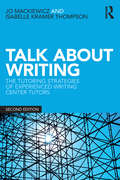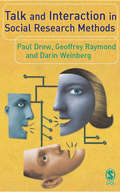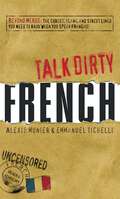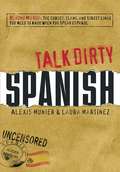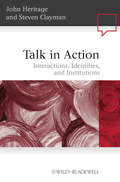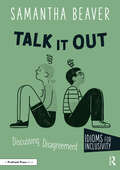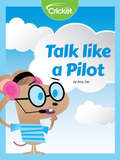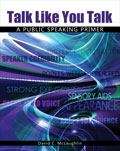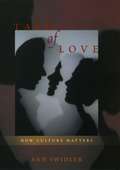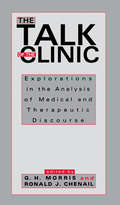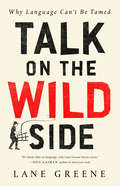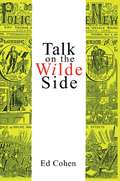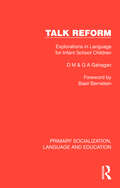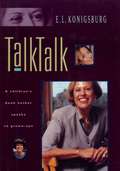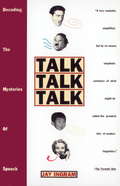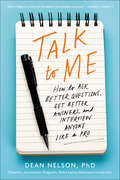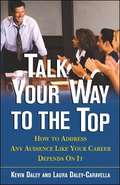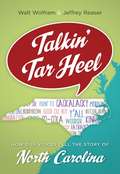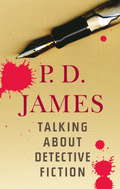- Table View
- List View
Talk about Writing: The Tutoring Strategies of Experienced Writing Center Tutors
by Jo Mackiewicz Isabelle ThompsonTalk about Writing: The Tutoring Strategies of Experienced Writing Center Tutors offers a book-length empirical study of the discourse between experienced tutors and student writers in satisfactory conferences. It analyzes writing center talk, focusing on tutors’ verbal strategies, at the macro- and microlevels. The study details tutors’ use of three categories of tutoring strategies—instruction, cognitive scaffolding, and motivational scaffolding—with each chapter of the analysis ending in practical advice about tutor training. The second edition adds to the discussion of research provided in the first edition, maintaining the two previous goals: to provide a theory-based coding scheme for analyzing tutoring strategies according to their potential for instructing and scaffolding student writers’ learning, and to demonstrate that analysis on 10 satisfactory conferences conducted by experienced writing center tutors. New to this edition, the authors expand the previous discussion of the coding scheme with additional details about its development. Along with the expanded Chapter 3 about research methods, this edition features new examples from the corpus of conferences and updates the literature review.
Talk and Interaction in Social Research Methods (Social Research Methods Ser.)
by Geoffrey Raymond Dr Paul Drew Darin Weinberg'This book admirably fulfils its stated objective of describing social research methods in action and exploring, from a range of perspectives, the linguistic shaping of social context. Overall, this is a balanced, well-edited and coherent collection of papers, bringing together high quality work from recognized authorities in the analysis of talk-in-interaction. It is also highly accessible; it would certainly make an excellent resource book for undergraduate, graduate (and practising!) social scientists ' - Rebecca Clift, University of Essex 'Talk and Interaction in Social Research Methodologies is a much-needed methods text. Focusing on research methods in action, the volume offers a new way of viewing the realities of social research. By taking language use seriously, the text reveals the details and depths of a wide range of research projects as they have seldom been presented before. This is the first book of its kind to offer such a powerful and insightful depiction of the role of talk-in-interaction in relation to social research methods. The book's plan is creative and unparalleled. There's nothing else like it. The editors--Paul Drew, Geoffrey Raymond and Darin Weinberg--represent the very best from multiple traditions of researching talk-in-interaction--from both sides of the Atlantic. The chapters are written by a sterling collection of researchers--a virtual honor roll of conversation analysts and kindred spirits. This book is a "must read" for social researchers of all disciplines who are interested in social interaction. It should be assigned reading for all graduate students being introduced to qualitative methods. It should be on every qualitative researcher's book shelf. It is a tour de force in demonstrating the absolutely fundamental position that language use holds in social science methodology' - James A Holstein, Marquette University This is a methodology text with a difference. It demonstrates the importance of talk in a variety of social research methodologies. Even documents, the seemingly least interactional form of social data, are shown to have important interactional dimensions. The book focuses systematically on how sociological methods are essentially conducted through forms of spoken interaction, and how these interactions shape the results that emerge in research. The book demonstrates: " How spoken interactions shape the outcomes of core research methodologies " The role which talk-in-interaction plays in key substantive areas of sociology notably race, crime, gender and media " Reveals the interactional underpinnings of research methodologies This is the first text aimed at an undergraduate and Master's audience in Sociology and Social Research, which shows the crucial part that spoken interaction plays in the conduct and products of conventional sociological methodologies.
Talk Dirty French: The curses, slang, and street lingo you need to Know when you speak francais
by Alexis MunierLet's be sérieux!Can't quite come up with the right French quip or four-letter word? With Talk Dirty: French, you'll be able to put your (middle) finger on it. Each entry provides an individual foreign gem, a useful French sentence employing the word, the expression's English counterpart, and its literal translation.Whether you're a native-speaker, world traveler, or just looking to tell off those brash Parisians, these naughty words and risqué slang will surely give your tongue a French twist.Les couilles: the balls French Expression: Je l'ai avertie-elle ne m'a pas écoute alors maintenant je m'en bats les couilles.Translation: I warned her--she didn't listen to me so now I'm washing my hands of it. Literal Translation: I warned her--she didn't listen to me so now I'm flapping my balls of it.
Talk Dirty French
by Alexis Munier Emmanuel TichelliCan't quite come up with the right French quip or four-letter word? With Talk Dirty: French, you'll be able to put your (middle) finger on it. Each entry provides an individual foreign gem, a useful French sentence employing the word, the expression's English counterpart, and its literal translation, comme ?a: Whether you're a native-speaker, world traveler, or just looking to tell off those brash Parisians, these naughty words and risquŽ slang will surely give your tongue a French twist.Les couilles: the ballsFrench Expression: Je l'ai avertie-elle ne m'a pas Žcoute alors maintenant je m'en bats les couilles.Translation: I warned her-she didn't listen to me so now I'm washing my hands of it.Literal Translation: I warned her-she didn't listen to me so now I'm flapping my balls of it.Alexis Munier relocated to Europe in her mid-twenties and began teaching English at world-renowned language schools in Russia, Slovenia, and Italy. Now a writer, English teacher, and translator, Munier still finds time to perfect her French slang and swoon from her Swiss husband's flattery now and again. She lives in Lausanne, Switzerland.Emmanuel Tichelli hails from a small town in French-speaking Switzerland, a country with four official languages. Growing up in a feisty French/Italian family, he learned the power of persuasive language at a young age. Tichelli argued with his parents in French, he spoke German at school, watched American TV, and hit on every Italian lady he met, in her native tongue. He lives in Lausanne, Switzerland.
Talk Dirty French
by Alexis Munier Emmanuel TichelliCan't quite come up with the right French quip or four-letter word? WithTalk Dirty: French, you'll be able to put your (middle) finger on it. Each entry provides an individual foreign gem, a useful French sentence employing the word, the expression's English counterpart, and its literal translation,comme ?a: Whether you're a native-speaker, world traveler, or just looking to tell off those brash Parisians, these naughty words and risqu? slang will surely give your tongue a French twist. Les couilles:the balls French Expression:Je l'ai avertie-elle ne m'a pas ?coute alors maintenant je m'en bats les couilles. Translation:I warned her-she didn't listen to me so now I'm washing my hands of it. Literal Translation:I warned her-she didn't listen to me so now I'm flapping my balls of it. Alexis Munierrelocated to Europe in her mid-twenties and began teaching English at world-renowned language schools in Russia, Slovenia, and Italy. Now a writer, English teacher, and translator, Munier still finds time to perfect her French slang and swoon from her Swiss husband's flattery now and again. She lives in Lausanne, Switzerland. Emmanuel Tichellihails from a small town in French-speaking Switzerland, a country with four official languages. Growing up in a feisty French/Italian family, he learned the power of persuasive language at a young age. Tichelli argued with his parents in French, he spoke German at school, watched American TV, and hit on every Italian lady he met, in her native tongue. He lives in Lausanne, Switzerland.
Talk Dirty Spanish: The curses, slang, and street lingo you need to Know when you speak espanol
by Alexis Munier¿Qué pasa, gringo?Whether at a cantina in Mexico or a discothèque in Spain, you better know how to shoot the s#*!. Luckily for you, Talk Dirty: Spanish dishes all the dirty sayings in a variety of dialects. Packed with plenty of four-letter words, habañero-hot insults, and wicked expressions, this book will have you speaking like a true hombre. The Spanish-to-English translations will help you learn all the latest foreign slang, such as:De puta madre: of the prostitute mother Spanish Phrase:¡Mi tío tiende un coche de puta madre!Translation: My uncle has a fantastic car! Literal Translation: My uncle has a car of a prostitute mother! Talk Dirty: Spanish--all you need for a sharper tongue and set of cojones.
Talk Dirty Spanish
by Alexis Munier Laura Martinez¿Qué pasa, gringo? Whether at a cantina in Mexico or a discothèque in Spain, you better know how to shoot the s#*!. Luckily for you, Talk Dirty: Spanish dishes all the dirty sayings in a variety of dialects. Packed with plenty of four-letter words, habañero-hot insults, and wicked expressions, this book will have you speaking like a true hombre. The Spanish-to-English translations will help you learn all the latest foreign slang, such as: De puta madre: of the prostitute mother Spanish Phrase: ¡Mi tío tiende un coche de puta madre! Translation: My uncle has a fantastic car! Literal Translation: My uncle has a car of a prostitute mother! Talk Dirty: Spanish--all you need for a sharper tongue and set of cojones.
Talk Dirty Spanish
by Alexis Munier Laura Martinez¿Qué pasa, gringo? Whether at a cantina in Mexico or a discothèque in Spain, you better know how to shoot the s#*!. Luckily for you, Talk Dirty: Spanish dishes all the dirty sayings in a variety of dialects. Packed with plenty of four-letter words, habañero-hot insults, and wicked expressions, this book will have you speaking like a true hombre. The Spanish-to-English translations will help you learn all the latest foreign slang, such as: De puta madre: of the prostitute mother Spanish Phrase: ¡Mi tío tiende un coche de puta madre! Translation: My uncle has a fantastic car! Literal Translation: My uncle has a car of a prostitute mother! Talk Dirty: Spanish--all you need for a sharper tongue and set of cojones.
Talk in Action: Interactions, Identities, and Institutions (Language in Society #44)
by John Heritage Steven ClaymanTalk in Action examines the language, identity, and interaction of social institutions, introducing students to the research methodology of Conversation Analysis. Features a unique focus on real-world applications of CA by examining four institutional domains: calls to emergency numbers, doctor-patient interaction, courtroom trials, and mass communication, Provides a theoretical and methodological overview of the roots of CA, reviewing the main developments and findings of research on talk and social institutions conducted over the past 25 years Showcases the significance of this subject to everyday events, making it ideal for students coming to the field for the first time Written by two leading figures in the field of Conversation Analysis
Talk It Out: Discussing Disagreement (Idioms for Inclusivity)
by Samantha BeaverTo get the complete Idioms for Inclusivity experience, this book can be purchased alongside four others as a set, Idioms for Inclusivity: Fostering Belonging with Language, 978-1-032-28635-8. Informed by sociolinguistic research, yet written accessibly, Talk It Out challenges readers to investigate disagreeing with someone as it relates to both language-use and inclusivity. This engaging and delightfully illustrated book invites students to engage with concepts such as: the cultural meaning of the idiom "talk it out" Facework and Politeness Theory, two frameworks that linguists use to research and understand disagreements why it can be so hard to like someone who disagrees with you why the expectation to "talk it out" could make someone feel excluded and how understanding the way language works can help us learn to be more inclusive. Featuring practical inclusivity tips related to integrating learning into daily conversations, this enriching curriculum supplement can be used in a Language Arts setting to learn about figurative language; in a Social Studies setting to discuss diversity, equity, inclusion, and belonging; or as an introduction to linguistics for students ages 7-14.
Talk Like a Pilot
by Amy TaoHave you ever flown on a plane and heard the pilot speaking in some kind of code? Now you can understand what he is saying! The alphabet is different for airplane pilots. Instead of ABC, pilots say Alpha, Bravo, Charlie. Learn this new way of communicating with Click and Jane as they use the phonetic alphabet and pretend to be airplane pilots!
Talk Like You Talk: A Public Speaking Primer
by David MclaughlinWhy do so many people fear public speaking? Maybe it’s because they feel like they have to become someone else, someone smarter and funnier. If people can learn to relax and just be themselves, public speaking can be easier. Not perfect, but better. <p><p> Sensory aids and stories really help. <p> Audiences want speakers who are more natural and conversational, so let’s pretend we are with a bunch of friends and we’re all excited about something, and we want to share it: “Hey, guys, you won’t believe what I just learned!” In other words, be normal and try to just talk like you talk. <p> Talk Like You Talk has many helpful hints and clever mnemonic tools to help the reader become a more natural speaker. Students say it is fun to read and that it truly reduces the fear of speaking.
Talk of Love: How Culture Matters
by Ann SwidlerTalk of love surrounds us, and romance is a constant concern of popular culture. Ann Swidler's "Talk of Love" is an attempt to discover how people find and sustain real love in the midst of that talk, and how that culture of love shapes their expectations and behavior in the process. To this end, Swidler conducted extensive interviews with Middle Americans and wound up offering us something more than an insightful exploration of love: "Talk of Love" is also a compelling study of how much culture affects even the most personal of our everyday experiences.
Talk of Love: How Culture Matters
by Ann SwidlerAnalysis of views of love & marriage from a primarily white, middle-class, west coast point of view.
The Talk of the Clinic: Explorations in the Analysis of Medical and therapeutic Discourse (Routledge Communication Series)
by G. H. MorrisThis collection of original papers by scholars who closely analyze the talk of the clinic features studies that were conceived with the aim of contributing to clinical practitioners' insight about how their talk works. No previous communication text has attempted to take such a practitioner-sensitive posture with its research presentations. Each chapter focuses on one or more performances that clinical practitioners -- in consort with their clients or colleagues -- must achieve with some regularity. These speech acts are consequential for effective practice and sometimes present themselves as problematic. Rather than calling for research to be simplified or reoriented in order for practitioners to understand it, these authors interpret state-of-the-art descriptive analysis for its practical import for clinicians. Each contributor delves deeply into clinical practice and its wisdom; therefore, each is positioned to identify alternative clinical practices and techniques and to appreciate practitioners' means of performing effectively. When reflective practitioners encounter these new pieces of work, productive alterations in how their work is done can be stimulated. By reading this work, reflective practitioners will now have new ways of considering their talk and new possibilities for speaking effectively. The volume is uniquely constructed so as to engage in dialogue with these reflective practitioners as they struggle to articulate their work. A practical wisdom-as-research trend has recently emerged in the clinical fields stimulating these practitioners to explore new and more informative ways -- communication and literary theory, ethnography, and discourse analysis -- to express what they do in clinics and hospitals. With the studies presented in this book, the editors build upon this dialectical process between practitioner and researcher, thus helping this productive conversation to continue.
Talk on the Wild Side: Why Language Can't Be Tamed
by Lane GreeneLanguage is the most human invention. Spontaneous, unruly, passionate, and erratic it resists every attempt to discipline or regularize it--a history celebrated here in all its irreverent glory.Language is a wild thing. It is vague and anarchic. Style, meaning, and usage are continually on the move. Throughout history, for every mutation, idiosyncrasy, and ubiquitous mistake, there have been countervailing rules, pronouncements and systems making some attempt to bring language to heel. From the utopian language-builder to the stereotypical grammatical stickler to the programmer trying to teach a computer to translate, Lane Greene takes the reader through a multi-disciplinary survey of the many different ways in which we attempt to control language, exploring the philosophies, motivations, and complications of each. The result is a highly readable caper that covers history, linguistics, politics, and grammar with the ease and humor of a dinner party anecdote.Talk on the Wild Side is both a guide to the great debates and controversies of usage, and a love letter to language itself. Holding it together is Greene's infectious enthusiasm for his subject. While you can walk away with the finer points of who says "whom" and the strange history of "buxom" schoolboys, most of all, it inspires awe in language itself: for its elegance, resourcefulness, and power.
Talk on the Wilde Side
by Ed CohenFirst published in 1993. Routledge is an imprint of Taylor & Francis, an informa company.
Talk Reform: Explorations in Language for Infant School Children (Primary Socialization, Language and Education)
by D. M. Gahagan G. A. GahaganOriginally published in 1970, Talk Reform describes the development of an exploratory language enrichment programme devised by the authors and carried out by teachers in a group of primary schools in a working-class area of London.Inspired by Bernstein’s theory of different language codes and their relation to educational underachievement, the authors devised a series of situations in the classroom as preconditions for extending language use. Their aim was to reorient the reader to the social functions of language, so that teachers who understood the ideas behind this programme would be able to carry out the activities described as well as those they may have thought up for themselves. The kinds of problems encountered when trying to judge the value of intervention and change in the classroom are discussed and illustrated, from the authors’ own research. The authors put forward the view that the social and linguistic skills that could be acquired in the way outlined in their book were crucial to the advancement of the working-class child in the social system. Today it can be read in its historical context.
Talk, Talk: A Children's Book Author Speaks to Grown-Ups
by E.L. KonigsburgIn TalkTalk E. L. Konigsburg presents a selection of speeches she has given over a period of 25 years. In her introduction to the first speech, and to the book as a whole, she explains:"While each of my books has been written because I had a story I wanted to tell, these speeches were written because I had something I wanted to say. The audience for the former is children; for the latter, adults.... I recognize -- with a measure of amused detachment -- that some were written as a reaction to trends; others, to fads.I have given these talks in cafetoriums, auditoriums, and the public rooms of Holiday Inns. Even though I have not always been on a stage when addressing an audience, I have tried to set the stage. Between talk and talk, I have written passages connecting the speeches to the time in which they were written and to one another. And that is TalkTalk."Always a thought-provoking speaker, she has chosen nine speeches that capture the essence of her years as a writer for children. When brought together, they enrich one another and provide a chance to look back at what children's books have been, to observe where they are now and to offer an insightful look at what books may continue to mean to children in the years to come. Written by an outstanding author, these speeches, individually and together, represent a vision of the need for books and the role books have played and should continue to play in the lives of children.
Talk Talk Talk: Decoding the Mysteries of Speech
by Jay IngramWith a mixture of erudition and humor, Canadian radio personality Jay Ingram discusses the sociology of talking: the dynamics of conversation, men and women's different propensities for interrupting, and even the proper use of "you know." But he also delves into the mystery-riddled physiology of talking. While we now know that certain areas of the brain seem to control specific aspects of speech--from articulating words to creating meaningful sentences--how do scientists explain the extraordinary case of the young stroke victim who lost only the words for fruits and vegetables? Is it possible that the ability to talk is actually encoded in our genes, as some scientists believe?From the language roots of North America to the speech differences between Neanderthals and Cro-Magnons, from modern children creating whole new languages in one generation to Freudian slips, from talking to yourself to speaking in tongues, Talk, Talk, Talk covers the gamut of humankind's most enigmatic and intriguing skill. Impeccably researched, lively and accessible, Talk, Talk, Talk is a book you won't be able to keep quiet about.
Talk, Text and Technology
by Inge KralTalk, Text and Technology is an ethnographic exploration of language, learning and literacy in remote Indigenous Australia. This unique work traces the historical transformation of one Indigenous group across four generations. The manner in which each generation adopts, adapts and incorporates new innovations and technologies into social practice and cultural processes is illuminated - from first mission contact and the introduction of literacy in the 1930s to youth media practices today. This book examines social, cultural and linguistic practices and addresses the implications for language and literacy socialisation.
Talk to Me: How to Ask Better Questions, Get Better Answers, and Interview Anyone Like a Pro
by Dean Nelson“The perfect guide to interviewing . . . anyone who speaks with fellow humans to acquire information will find Nelson’s guidance priceless.” —Tom Foster, New York Times–bestselling author of How to Read Literature Like a ProfessorInterviewing is the single most important way journalists (and doctors, lawyers, social workers, teachers, human resources staff, and, really, all of us) get information. Yet to many, the perfect interview feels more like luck than skill—a rare confluence of rapport, topic, and timing. But the thing is, great interviews aren’t the result of serendipity and intuition, but rather the result of careful planning and good journalistic habits. And Dean Nelson is here to show you how to nail the perfect interview every time. Drawing on forty-years of award-winning journalism and his experience as the founder and host of the Writer’s Symposium by the Sea, Nelson walks you through each step of the journey from deciding whom to interview and structuring questions, to the nitty gritty of how to use a recording device and effective note-taking strategies, to the ethical dilemmas of interviewing people you love (and loathe). He also includes case studies of famous interviews to show how these principles play out in real time. Chock full of comprehensive, time-tested, gold-standard advice, Talk to Me is a book that demystifies the art and science of interviewing. “One of the best interviewers around.” —Anne Lamott, New York Times–bestselling author of Help, Thanks, Wow
Talk Your Way To The Top: How to Address Any Audience Like Your Career Depends On It
by Laura Daley-Caravella Kevin Daley<p>Field-proven presentation tips and communication skills, from two of today's top corporate coaches. <p>Every business situation is both a presentation and a chance to leave a positive impression. In <i>Talk Your Way to the Top</i>, corporate communications gurus Kevin Daley and Laura Daley-Caravella give readers the know-how to recognize and maximize the opportunities they face throughout the day. <p>Each chapter represents a specific situation, from running a meeting to disagreeing with the boss, and outlines the steps needed to handle it with poise, skill, and success. <p>Communication has a tremendous impact on how professionals are judged. <i>Talk Your Way to the Top</i> gives them the skills they need to: <p> <li>Know when and where to speak up--versus when to shut up <li>Convey passion and make it contagious <li>Connect with an audience on multiple levels</li>
Talkin' Tar Heel
by Walt Wolfram Jeffrey ReaserAre you considered a "dingbatter," or outsider, when you visit the Outer Banks?Have you ever noticed a picture in your house hanging a little "sigogglin," or crooked?Do you enjoy spending time with your "buddyrow," or close friend? Drawing on over two decades of research and 3,000 recorded interviews from every corner of the state, Walt Wolfram and Jeffrey Reaser's lively book introduces readers to the unique regional, social, and ethnic dialects of North Carolina, as well as its major languages, including American Indian languages and Spanish. Considering how we speak as a reflection of our past and present, Wolfram and Reaser show how languages and dialects are a fascinating way to understand our state's rich and diverse cultural heritage. The book is enhanced by maps and illustrations and augmented by more than 100 audio and video recordings, which can be found online at talkintarheel.com.
Talking About Detective Fiction
by P. D. JamesIn a perfect marriage of author and subject, P. D. James--one of the most widely admired writers of detective fiction at work today--gives us a personal, lively, illuminating exploration of the human appetite for mystery and mayhem, and of those writers who have satisfied it.P. D. James examines the genre from top to bottom, beginning with the mysteries at the hearts of such novels as Charles Dickens's Bleak House and Wilkie Collins's The Woman in White, and bringing us into the present with such writers as Colin Dexter and Henning Mankell. Along the way she writes about Arthur Conan Doyle, Dorothy L. Sayers, Agatha Christie ("arch-breaker of rules"), Josephine Tey, Dashiell Hammett, and Peter Lovesey, among many others. She traces their lives into and out of their fiction, clarifies their individual styles, and gives us indelible portraits of the characters they've created, from Sherlock Holmes to Sara Paretsky's sexually liberated female investigator, V. I. Warshawski. She compares British and American Golden Age mystery writing. She discusses detective fiction as social history, the stylistic components of the genre, her own process of writing, how critics have reacted over the years, and what she sees as a renewal of detective fiction--and of the detective hero--in recent years.There is perhaps no one who could write about this enduring genre of storytelling with equal authority and flair: it is essential reading for every lover of detective fiction.From the Hardcover edition.
